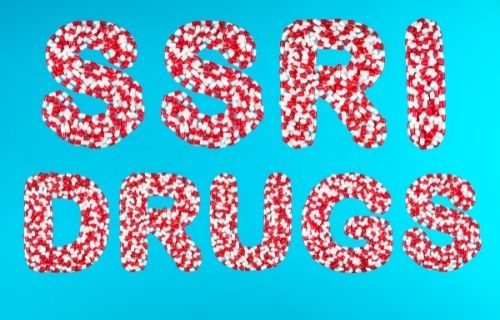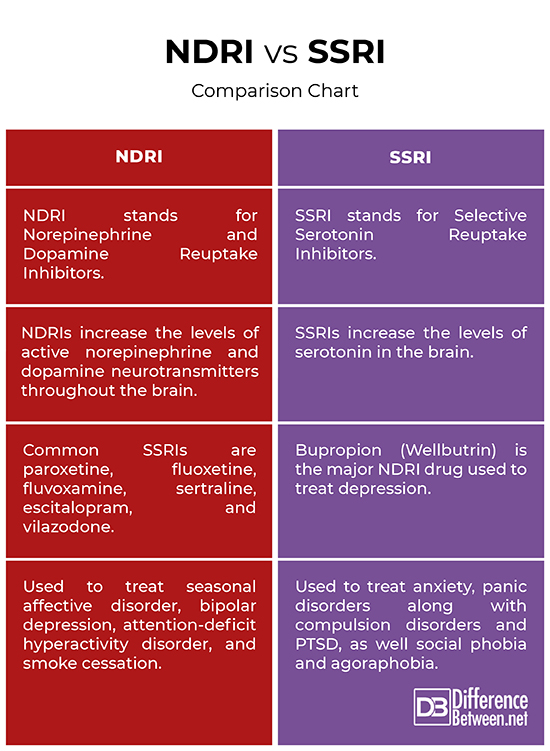Difference Between NDRI and SSRI
At some point of time, almost every person may appear to be stressed. Usually, the depression is slight and goes away with time, but sometimes it can affect your relationships and work life, and lead to illness. With such an intervention, antidepressant drugs have become the first order of business. Some of the most common prescribed antidepressants are reuptake inhibitors. These medications are among those most commonly prescribed by psychiatrists and other physicians. NDRIs and SSRIs are some of the most frequently prescribed types of antidepressants.

What NDRI?
Norepinephrine and Dopamine Reuptake Inhibitors (NDRIs) are a class of reuptake inhibitors prescribed for depression, anxiety and other mental health conditions. NDRIs are antidepressant medications that block the action of the norepinephrine transporter (NET) and the dopamine transporter (DAT), resulting in increased concentrations of dopamine. Bupropion (Wellbutrin) is the major drug type used to treat depression. It is prescribed for the treatment of major depressive disorder, seasonal affective disorder, and smoke cessation.
These types of medications target where the nerves release the hormones norepinephrine and dopamine in the brain helping decrease how rapidly it’s broken down in the nerves thus keeping your levels higher. Norepinephrine and dopamine are neurotransmitters that help regulate the different functions of the body like mood, appetite, digestion, social behavior, sleep, and memory among many things. They affect chemicals within the brain that nerves use to send messages to each other.

WHAT IS SSRI?
Selective Serotonin Reuptake Inhibitors (SSRIs) are the most commonly prescribed antidepressants that treat depression by increasing levels of serotonin in the brain. They work by inhibiting a mechanism called reuptake. In reuptake, a protein called a transporter transports excess neurotransmitter molecules out of the synaptic cleft, usually back into the neuron that released them. SSRIs are usually the first choice of medicine to treat depression, and are often used along with a talking therapy such as cognitive behavioral therapy (CBT).
SSRIs are a common antidepressant that is prescribed and they can also treat anxiety, panic disorders along with compulsion disorders and PTSD. They are also used to treat several mental health conditions, including phobias, such as social phobia and agoraphobia. These are usually taken in tablet form for two to four weeks before the effects start to show up. Some common SSRIs include paroxetine, fluoxetine, fluvoxamine, sertraline, escitalopram, and vilazodone.
Difference between NDRI and SSRI
Type
– Both NDRIs and SSRIs are the most commonly prescribed class of antidepressant drugs that act as reuptake inhibitors, which are commonly used drugs for the treatment of depression, anxiety, and other psychiatric conditions. NDRIs increase the levels of active norepinephrine and dopamine neurotransmitters throughout the brain. SSRIs, on the other hand, increase the levels of serotonin in the brain.
Neurotransmitters
– Both the antidepressant drugs work by targeting brain chemicals called neurotransmitters that help regulate the different functions of the body. However, they work by targeting different neurotransmitters in the body. NDRIs block the action of the norepinephrine transporter (NET) and the dopamine transporter (DAT), resulting in increased concentrations of dopamine. SSRIs, on the other hand, treat depression by increasing levels of serotonin in the brain.
Drugs
– The commonly FDA-approved SSRIs used to treat depression are paroxetine, fluoxetine, fluvoxamine, sertraline, escitalopram, and vilazodone. These are usually taken in tablet form for two to four weeks before the effects start to show up. Bupropion (Wellbutrin) is the major NDRI drug used to treat depression. It is also prescribed for the treatment of major depressive disorder, seasonal affective disorder, and smoke cessation. Bupropion is the only NDRI sold on the market.
Benefits
– SSRIs can also treat anxiety, panic disorders along with compulsion disorders and PTSD. They are also used to treat several mental health conditions, including phobias, such as social phobia and agoraphobia. NDRI drugs are primarily used to treat depression. In addition, they may be used to help with major depressive disorder, seasonal affective disorder, bipolar depression, attention-deficit hyperactivity disorder, and smoke cessation.
NDRI vs. SSRI: Comparison Chart

Summary
All antidepressant medications including SSRIs and NDRIs work similarly; they basically work by targeting chemicals in the brain called neurotransmitters. But each medication works by targeting different neurotransmitters. For instance, NDRIs increase the levels of active norepinephrine and dopamine neurotransmitters throughout the brain, resulting in increased concentrations of dopamine. SSRIs are also a common class of antidepressant drugs, but they target the levels of serotonin in the brain. There are many SSRI drugs available out there whereas Bupropion is the only NDRI drug sold on the market.
What is a NDRI antidepressant?
NDRIs are a class of antidepressant drugs that increase the levels of active norepinephrine and dopamine neurotransmitters throughout the brain, resulting in increased concentrations of dopamine.
How is Wellbutrin different from other antidepressants?
Bupropion, sold under the brand name Wellbutrin, is a typical antidepressant drug used to treat depression. Most antidepressant drugs come under the category of SSRIs. However, Wellbutrin is a type of NDRI drug and probably the only NDRI drug sold on the market.
What is the difference between an SNRI and an SSRI?
SSRIs prevent the reuptake of serotonin in the brain whereas SNRIs prevent the reuptake of both serotonin and norepinephrine within the brain.
Can NDRI cause serotonin syndrome?
NDRI drug may cause serotonin syndrome if combined with other medications such as Monoamine oxidase inhibitors.
- Difference Between Caucus and Primary - June 18, 2024
- Difference Between PPO and POS - May 30, 2024
- Difference Between RFID and NFC - May 28, 2024
Search DifferenceBetween.net :
 Email This Post
: If you like this article or our site. Please spread the word. Share it with your friends/family.
Email This Post
: If you like this article or our site. Please spread the word. Share it with your friends/family.
Leave a Response
References :
[0]Rosa, Joaquín M. Campos and M. Encarnación Camacho Quesada. Drugs and Their Biological Targets. Berlin, Germany: Walter de Gruyter GmbH, 2017. Print
[1]Walker, Audrey, et al. Introduction to Psychiatry: Preclinical Foundations and Clinical Essentials. Cambridge, United Kingdom: Cambridge University Press, 2021. Print
[2]Norepinephrine Reuptake Inhibitors—Advances in Research and Application: 2012 Edition: ScholarlyPaper. Georgia, United States: ScholarlyEditions, 2012. Print
[3]Mitchell, E. Siobhan and D. J. Triggle. Antidepressants. New York, United States: Infobase Publishing, 2009. Print

